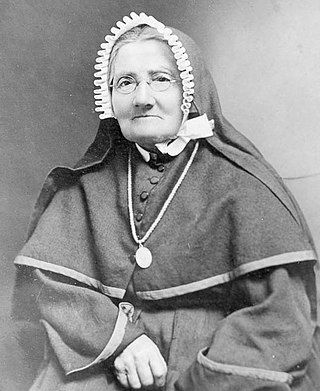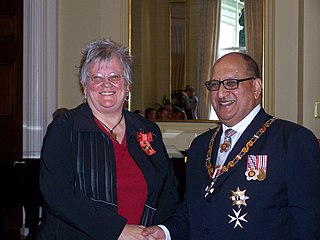
Parasports are sports played by people with a disability, including physical and intellectual disabilities. Some parasports are forms of adapted physical activities from existing able-bodied sports, while others have been specifically created for persons with a disability and do not have an able-bodied equivalent. Disability exists in four categories: physical, mental, permanent and temporary. At a competitive level, disability sport classifications are applied to allow people of varying abilities to face similar opposition.

Sir Murray Gordon Halberg was a New Zealand middle-distance runner who won the gold medal in the 5000 metres event at the 1960 Olympics. He also won gold medals in the 3 miles events at the 1958 and 1962 Commonwealth Games. He worked for the welfare of children with disabilities since he founded the Halberg Trust in 1963.
Katherine Victoria O'Regan was a New Zealand politician. She was a member of parliament from 1984 to 1999, representing the National Party. She served as a minister for the National Government for six of those years.

SuzanneAubert, better known to many by her religious name name Mary Joseph or "Mother Aubert", was a religious sister who started a home for orphans and the under-privileged in Jerusalem, New Zealand on the Whanganui River in 1885. Aubert first came to New Zealand in 1860 and formed the Congregation of the Holy Family to educate Māori children. She founded a religious order, the Daughters of Our Lady of Compassion in 1892. Aubert later started two hospitals in Wellington; the first, St Joseph's Home for the Incurables in 1900, and Our Lady's Home of Compassion in 1907.
Eva Marion "Eve" Rimmer née Davies was a New Zealand Paralympic athlete. She was born in Whanganui, New Zealand and became one of New Zealand's greatest paraplegic athletes, winning 32 medals – including 22 gold medals – for athletics and swimming at international sporting events. Growing up in the small rural town of Edgecumbe, Eve was a talented young athlete. As Eve says in her biography "On natural ability alone, I held the school's long jump record for many years". This made up for her poor academic credentials. As soon as she was old enough she left school. In 1952 at age fifteen, Eve was left paralysed from the waist down when the vehicle she was in crashed on a dark wet night. This life changing experience did not prevent Eve Rimmer from becoming one of the best athletes in the world. She went on to be a multi-medal winner in shot put, javelin, pentathlon, discus, swimming and archery, In 1973 she received the British Empire Medal.
"The normalization principle means making available to all people with disabilities patterns of life and conditions of everyday living which are as close as possible to the regular circumstances and ways of life or society." Normalization is a rigorous theory of human services that can be applied to disability services. Normalization theory arose in the early 1970s, towards the end of the institutionalisation period in the US; it is one of the strongest and long lasting integration theories for people with severe disabilities.

John Baldwin Munro, better known as J. B. Munro, was a New Zealand politician of the Labour Party. He was also a notable disability advocate.

Jodi Anne Brown is a retired New Zealand netball player. Brown was a member of the New Zealand national netball team, the Silver Ferns from 2002 to 2015, taking time off in between those periods due to injury and pregnancy, earning 61 caps. She has also played elite domestic netball in New Zealand for 13 years, and has signed with the Southern Steel for 2014. She played for the Central Pulse in 2015 and was getting set to play her final season in 2016 before she injured her ACL in the preseason and decided to retire from domestic netball after she had retired from international netball in 2015. In 2015, Jodi began co-coaching at St Hilda's Collegiate, Dunedin with the year nine A team. She has since followed this team through the years, which included a devastating 1 point loss in the SISS final. In 2018, Brown coached the St Hilda's Senior A team and also coached the Dunedin U17 team to 11th place at Nationals.

Sexuality and disability is a topic regarding the sexual behavior and practices of people with disabilities. Like the general population, these individuals exhibit a wide range of sexual desires and adopt diverse methods of expressing their sexuality. It is a widespread concern, however, that many people with disabilities do not receive comprehensive sex education, which could otherwise positively contribute to their sexual lives. This roots from the idea that people with disabilities are asexual in nature and are not sexually active. Although some people with disabilities identify as asexual, generalizing this label to all such individuals is a misconception. Many people with disabilities lack rights and privileges that would enable them to have intimacy and relationships. When it comes to sexuality and disability there is a sexual discourse that surrounds it. The intersection of sexuality and disability is often associated with victimization, abuse, and purity.
Valerie Sinason is a British poet, writer, psychoanalyst and psychotherapist who is known for promoting the idea that people with a developmental disability can benefit from psychoanalysis and also that satanic ritual abuse is widely practiced in the UK. She ran the workshop dealing with intellectual disability at the Tavistock Clinic for twenty years and also worked for 16 years as a consultant research psychotherapist at St George's Hospital Medical School. She is a Trustee of the Institute for Psychotherapy and Disability.
Philippa June Baker, now known by her married name Philippa Baker-Hogan, is a former New Zealand rower and politician. She was the first New Zealand woman to win a gold medal at World Rowing Championships and won gold at world championships on two more occasions. She has twice represented New Zealand at the Olympics. She has received numerous awards for her rowing success and in 2012, she and fellow double sculler Brenda Lawson were inducted into the New Zealand Sports Hall of Fame. A trained radiographer, she manages her husband's medical practice. She has been a Whanganui District Health Board and Wanganui District Council member since 2004 and 2006, respectively, and was a mayoral candidate in 2010. She is a member of the New Zealand Labour Party.
INAS is a federation which was established in 1986 by professionals in the Netherlands who were involved in sport and wanted to promote the participation of athletes with mental handicap in elite sports.

Sir Robert George Martin is a disability rights activist from New Zealand who has promoted the self advocacy movement internationally and was involved in the proceedings resulting in the United Nations Convention on the Rights of Persons with Disabilities. He is a member of the United Nations Committee on the Rights of Persons with Disabilities for the 2017–2020 term.

The Whanganui District Health Board was a district health board that provided healthcare to the Wanganui, Rangitikei, and parts of the Ruapehu districts of New Zealand. In July 2022, it was merged into the national health service Te Whatu Ora.
Cameroonian Federation of Sports the Intellectually Disabled (FECASDI) (French: Federation Camerounaise Des Sports Pour Deficients Intellectuals(Fecasdi)) is the national sports federation for sportspeople with intellectual disabilities competing in International Sports Federation for Persons with Intellectual Disability (INAS) and Paralympic events. They organize national ID sports championships. The federation was recognized by law in 2010, and then became a member of the Cameroonian Paralympic Committee in 2011. FECASDI has tried to get its sportspeople qualified for the 2012 Summer Paralympics. They have also hosted several conferences.
ID sports in Cameroon are played in the country by people with intellectual disabilities. These sports are governed by Cameroonian Federation of Sports the Intellectually Disabled (FECASDI) and Special Olympics Cameroon. People with intellectual disabilities in Cameroon lack the same access to educational opportunities as people with other disability types in Cameroon. Development for sporting opportunities for them began in 1995, when Special Olympics came to Cameroon. Since then, other development activities have taken place, focusing on ID football and ID sport in general. Funding for ID sports is often limited.
The 1959 New Year Honours in New Zealand were appointments by Elizabeth II on the advice of the New Zealand government to various orders and honours to reward and highlight good works by New Zealanders. The awards celebrated the passing of 1958 and the beginning of 1959, and were announced on 1 January 1959.

Dame Lesley Max is a New Zealand children's advocate.

Olive Webb is a New Zealand clinical psychologist and former president of the New Zealand Psychological Society from 1993 until 1995. Webb's experiences of poor patient conditions and treatment while working at Sunnyside Hospital in the 1970s inspired her to become a disability advocate. She received the New Zealand Order of Merit in 2008, for services to people with intellectual disabilities. Webb is the longest-serving member of the Canterbury District Health Board, holding a position on the board from 2001 to 2013.









